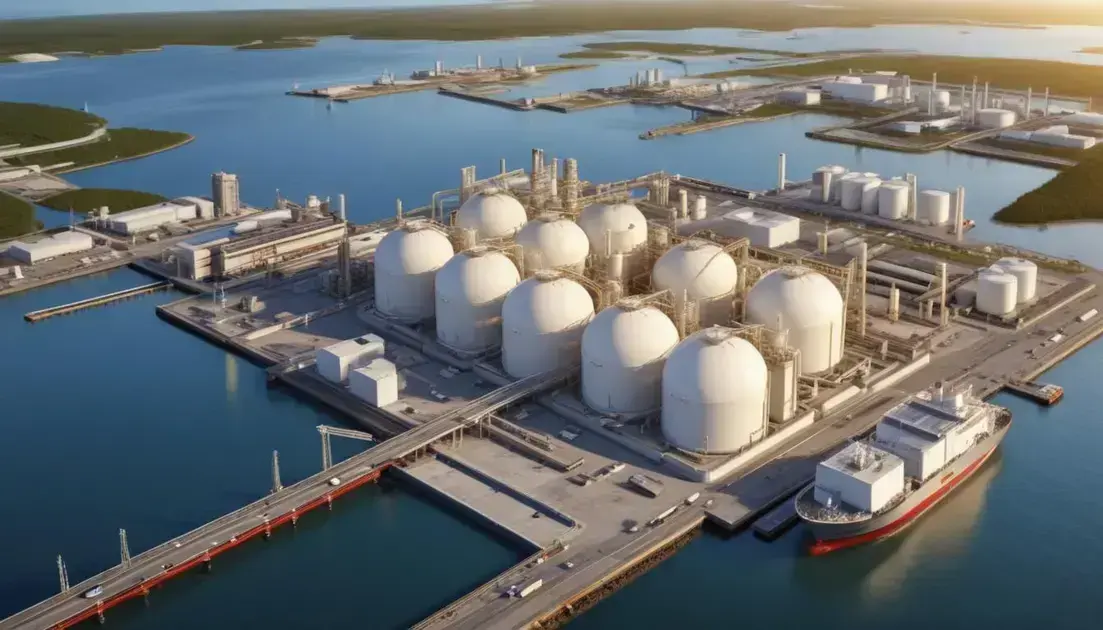Shell’s Strategic Move: Acquiring Pavilion Energy
LNG is a cleaner alternative to traditional fossil fuels, significantly reducing greenhouse gas emissions and supporting the global energy transition while enhancing energy security and sustainability.
The recent acquisition of Pavilion Energy by Shell highlights the growing importance of LNG in the energy transition. Have you considered how such moves affect the global market?
Pavilion Energy’s Role in LNG Market
Pavilion Energy plays a significant role in the LNG market by actively contributing to the global supply chain of liquefied natural gas. As a major player, it focuses on enhancing energy security and reliability. Pavilion Energy’s strategic operations aim to provide a stable supply of LNG, catering to both existing and emerging markets.
Investment in Infrastructure: The company invests heavily in infrastructure development to support the growth of LNG consumption. This includes terminals, distribution networks, and supply agreements that ensure availability to end-users. The emphasis on building robust infrastructures allows Pavilion Energy to effectively manage fluctuations in demand and supply.
Moreover, Pavilion Energy is committed to advancing sustainability practices within the LNG sector. By prioritizing environmental standards, the company strives to minimize its carbon footprint. This aligns with the increasing global emphasis on cleaner energy solutions, positioning LNG as a bridge towards a more sustainable future.
Through partnerships and collaborations, Pavilion Energy enhances its market reach and strengthens its operational capabilities. This collaborative approach not only supports growth but also fosters innovation in the LNG sector, verifying its commitment to leading the energy transition.
Shell’s Expansion in Liquified Natural Gas
Shell’s expansion in liquefied natural gas (LNG) showcases its commitment to becoming a leader in the global energy transition. By investing in LNG infrastructure, Shell aims to enhance energy security while reducing carbon emissions. This shift is vital as LNG provides a cleaner alternative to traditional fossil fuels.
Global Projects: The company is actively pursuing several international projects that expand its LNG capabilities. These ventures include new export terminals and partnerships that optimize supply chains. Shell’s strategic focus on developing LNG assets aligns with its goals to meet growing energy demands worldwide.
Additionally, Shell emphasizes the importance of sustainability in its LNG operations. By adopting advanced technologies, the company seeks to minimize environmental impacts while maximizing efficiency. This commitment to sustainable practices is crucial as the energy sector evolves.
Shell’s investments also reflect a response to market dynamics, where demand for cleaner energy sources is rapidly increasing. The company’s ability to adapt and innovate in the LNG market positions it as a key player in facilitating the global shift toward more sustainable energy solutions.
The Environmental Benefits of LNG
The adoption of liquefied natural gas (LNG) offers significant environmental benefits that align with global sustainability goals. As a cleaner alternative to coal and oil, LNG produces lower emissions of greenhouse gases, making it a favorable choice for energy production.
One of the most notable advantages of LNG is its ability to reduce carbon dioxide emissions. When combusted, LNG emits significantly less CO2 per unit of energy compared to coal. This property is essential in efforts to combat climate change and transition to a low-carbon future.
Additionally, LNG’s lower levels of sulfur dioxide and nitrogen oxides contribute to improved air quality. These reductions can have positive impacts on public health, particularly in urban areas where air pollution is a major concern.
The flexibility of LNG in replacing older, less efficient power plants further enhances its environmental profile. By facilitating the integration of renewable energy sources, LNG can support the gradual transition towards a more sustainable energy landscape. As pressures to meet climate targets increase, the role of LNG in fostering a cleaner energy mix becomes increasingly vital.
Future Directions for Shell and Pavilion Energy
As the energy landscape evolves, both Shell and Pavilion Energy are poised to explore new directions in the liquefied natural gas (LNG) sector. These companies recognize the potential of LNG to play a crucial role in meeting the world’s growing energy demands while addressing climate change.
A key component of their future strategies includes investing in advanced technologies that enhance the efficiency of LNG production and distribution. These innovations are aimed at reducing costs and minimizing environmental impacts, thereby supporting the transition to a cleaner energy future.
Additionally, Shell and Pavilion Energy are likely to focus on expanding their global footprint. By securing new partnerships and tapping into emerging markets, they can ensure a steady supply of LNG and streamline operations across various regions. This global outreach is essential as countries strive to diversify their energy sources.
Sustainability will remain at the forefront of their initiatives. Both companies have committed to setting ambitious targets for reducing greenhouse gas emissions aligned with international climate agreements. By prioritizing environmentally friendly practices, they not only enhance their market appeal but also contribute positively to global sustainability efforts.
In conclusion
The future of liquefied natural gas (LNG) is looking brighter as both Shell and Pavilion Energy take steps to innovate and expand. Their commitment to sustainability and investment in new technologies will play a vital role in shaping the energy landscape.
By focusing on reducing emissions and enhancing efficiency, these companies are not just adapting to changes; they are leading the way towards a greener future. Their collaborative efforts in the LNG market will help meet the growing global energy demand while ensuring a cleaner environment.
As we move forward, it is essential for these energy leaders to continue pushing for advancements that align with climate goals. Together, Shell and Pavilion Energy can make significant contributions to a sustainable energy transition.
With the right strategies in place, they will not only benefit their businesses but also the planet.
Frequently Asked Questions
What role does LNG play in reducing greenhouse gas emissions?
LNG emits significantly lower levels of carbon dioxide compared to coal and oil, helping to reduce overall greenhouse gas emissions in energy production.
How are Shell and Pavilion Energy addressing sustainability?
Both companies are investing in technologies and practices that promote sustainability, focusing on reducing emissions and environmental impacts while expanding their LNG operations.
What benefits does investing in LNG infrastructure provide?
Investing in LNG infrastructure enhances energy security, improves access to cleaner energy, and supports the integration of renewable energy sources.
Why is collaboration important in the LNG market?
Collaboration helps companies like Shell and Pavilion Energy share resources, technology, and knowledge, which can lead to greater efficiency and innovation in the LNG sector.
How does LNG support the energy transition?
LNG acts as a transitional fuel that can help bridge the gap between traditional fossil fuels and renewable energy sources, providing a cleaner alternative while supporting energy needs.
What future trends can we expect in the LNG industry?
Future trends may include increased technological advancements, more sustainable practices, and expanded market presence as demand for cleaner energy solutions continues to grow.






